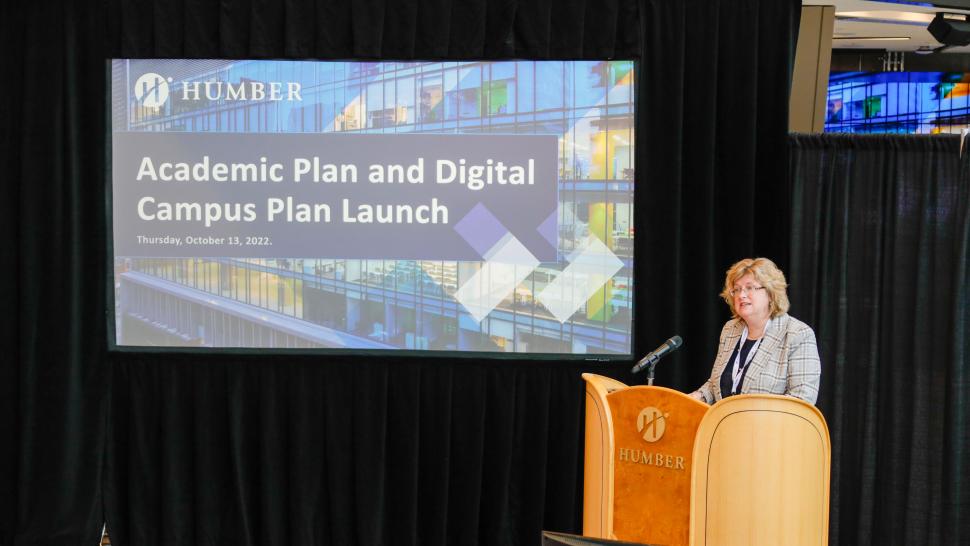
Humber College has released a pair of transformative plans that will help shape and guide the future of the college for the next several years.
The Digital Campus Plan and the Academic Plan are forward-looking, three-year documents that identify future-focused priorities and strategic opportunities to support innovation in the ways the Humber community teaches, learns and works. The two plans, which are for the years 2023 to 2026, were developed simultaneously and with close integration.
"Humber continues to build on the strengths of our unique model of polytechnic education while always seeking to improve and foster local and global partnerships and strengthen capacity for innovation,” said Humber College President and CEO Dr. Ann Marie Vaughan. “We are focused on the future and creating educational and campus experiences that set students and employees up for success today and tomorrow."
The plans were developed to align and integrate with Humber’s EDI Framework and are guided by the college’s commitment to equity, diversity and inclusion and Indigenous ways of being, knowing and doing to ensure that equity-deserving groups are supported.
Gina Antonacci, senior vice-president, Academic at Humber, said the Academic Plan – titled Looking Forward – recognizes the changing and critical role polytechnic institutions play in Canada as Humber responds to shifting labour market needs by offering programs that are meaningful and life-changing.
Antonacci added that the plan responds to ongoing technological advances that will continue to influence higher education through curriculum, program delivery modes and the goals and expectations of the college’s learners and industry partners.
Academic Plan priorities
The Academic Plan has identified three priorities:
• Expanding Humber’s range of credentials, pathways, and recognition of prior learning processes to support transitions between high school, post-secondary education, and employment;
• Creating flexible program and course delivery options that enable students to personalize their learning experience while meeting their long- and short-term educational goals;
• Supporting faculty and staff to initiate projects that enable innovation and create new ways of teaching and learning at Humber.
“Our Academic Plan reflects the need for the continued evolution of our credential mix and the need to offer students more flexible and personalized options to study,” said Antonacci. “It presents an opportunity to continue to explore the ways in which teaching and learning can continue to be innovative and creative.”
Humber’s Vice President, Digital Innovation and Chief Information Officer Scott Briggs said the Digital Campus Plan, which is titled The Digital Campus of Tomorrow, focuses on organizational change projects that are enabled by technology for the benefit of students, faculty, and staff. It also prioritizes technology that enhances teaching and learning and allows Humber to be more agile, connected, impactful and sustainable, Briggs added.
“We are working to meet students and employees where they are and provide them with the tools, access and skills to be as successful as possible,” said Briggs. “We will achieve this through a deepening of relationships with our digital partners, training for staff and faculty, evaluating and updating our technology, and facilitating changes that support the future of work.”

Digital Campus plan priorities
The Digital Campus Plan has also identified three priorities:
• Developing the digital fluency of Humber’s students, faculty and staff so they can be engaged global citizens;
• Simplifying and personalizing the experience for prospects, applicants, students, learners and alumni as they explore what Humber has to offer and access services;
• Supporting Humber employees in the transformation and the future of work so they can collaborate, be effective and stay connected with campus culture.
Consultations for the plans were conducted jointly and included students, faculty, staff, alumni, Program Advisory Committees, the Humber College Council, college leadership, Academic and Student Affairs, and the Board of Governors. Specific sessions were held for those from equity-deserving groups.
Chantal Joy, associate dean, Transition and Academic Support with Student Support and Engagement at Humber, attended the live launch of the plans on October 13. Much of Joy’s work is connected to Humber’s academic enterprise so gaining a fuller understanding of the direction the college is heading with the plans was of significant interest.
“There was a real effort to make them very learner-driven, which I feel is important,” said Joy.
Follow the links to view the new webpages for the Digital Campus Plan and the Academic Plan.